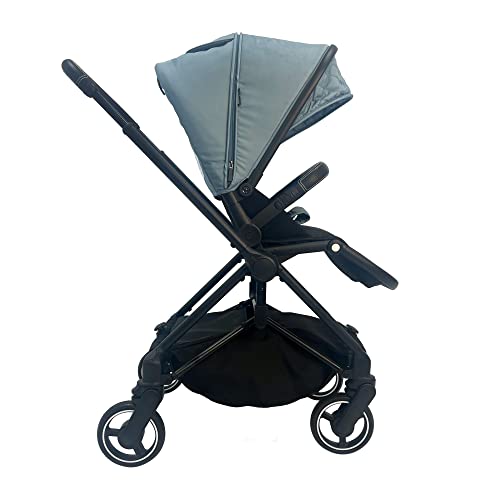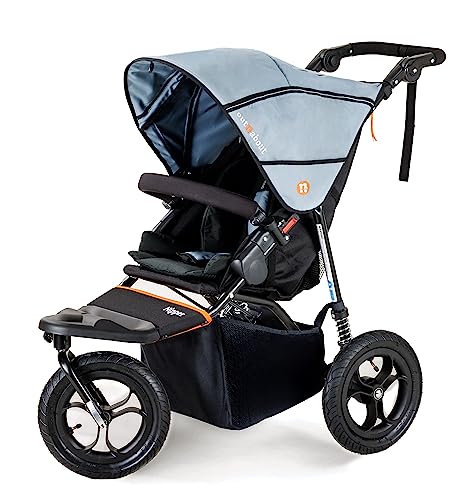5 Must-Know Parent Facing Pram-Practices You Need To Know For 2023
페이지 정보
Shelley Sisley 24-11-20 16:59 view21 Comment0관련링크
본문
 Monitor Your Little One's Wellbeing With a Parent Facing Pram
Monitor Your Little One's Wellbeing With a Parent Facing PramWhen your baby is cuddled in a parent-facing pram, you can observe their well-being and comfort. This is particularly helpful on busy days.
 A study by the University of Dundee found babies in face-to-face buggies chatted twice as often, laughed more and had lower heart rates - all indicators that they were less stressed.
A study by the University of Dundee found babies in face-to-face buggies chatted twice as often, laughed more and had lower heart rates - all indicators that they were less stressed.Peace of Mind
A pram with a parent's face is a great way to protect your baby's security. They will be kept in a safe seat that is securely secured by the five-point harness, making them safe from any accidents that could occur when they are out and about.
A good quality pram has an ample basket that can hold all the baby's essentials, so you don't have to think about where the other items will be placed. It is also essential to have the proper accessories to ensure that your child is at ease during their journey. For example the footmuff that is compatible with a five-point harness and a lining prams for newborns the pram to shield your child from the rain or sun.
When selecting a pushchair to your new baby it is essential to test drive it and choose the appropriate model for your child and yourself. Models with swivel-wheels for ease of maneuverability and adjustable handlebars make it easier for all family members to operate.
A safety harness is crucial for parents who are worried about their child falling out of the buggy. It will stop your baby from being able to escape the seat. It's also great for keeping them safe in case of an emergency.
It's important to know that some experts on babies recommend that babies are around six months old before they can use an infant stroller with a front view however this is subject to individual development milestones. But, some babies will be ready to enter the world earlier, particularly those who are fascinated and eager to learn more about the world around them.
Parents might be concerned that their baby may develop a flat area on the back of his head if they sit in a pram with their backs to them, but there's no need to worry. Auckland osteopath Julia Griffiths suggests that babies need to spend a lot of time lying down in order to strengthen their skull muscles, and this is usually accomplished by using a baby carrier in a position that is affixed to the parent along with supervised belly time.
Bonding Improved
It is crucial to think about the direction that your baby is facing when out and about, whether you are using a pram or a pushchair. It may seem like a small detail but it has a big impact on your baby's development and interaction with you when out and out and about.
A new study has found that babies in away-facing buggies are less likely to engage in conversation or interact with their parents than those who use a parent facing pushchair. The study involved 2,722 kids with their mothers in 60 cities, as well as another study that concentrated on 20 mothers and their infants. The findings reveal that babies who are in a front-facing pram with their parents are twice more likely to smile at each other than those who are in a buggy that is away from the parents. The reason behind this is that when your baby is able to see you, they will be more engaged and eager to share the experience with you, encouraging interaction and bonding.
Babies have so much to learn about the world around them, and facing each other in the process can help them develop and build bonds. You can also point out things to them, such as flowers or playgrounds, as well as other objects that they may not otherwise notice.
However, it is important to keep in mind that your child should be able to sit independently before turning into a pushchair that faces the front. Children older than this may find it difficult to adjust and may be more stressed when they must move from an inward position to an outward position.
The best way to be sure your baby is ready for the change is to get them tested by a medical professional. They can ensure that your child's muscle and bones are strong enough to take on the change, and also make sure they have not developed any hyper-sensitive spots. This test is especially crucial if your child has been using your pushchair newborn from birth or when you previously used a pram with rear-facing seats. A doctor can help you determine if it is safe for your child to take a seat in a pushchair that faces forward.
Better Eye Contact
One of the best things about having a pram with a parent facing feature is being able to make eye contact with your baby. This is especially important for infants and newborns who are still learning how to interact with the world. You can also play and talk to them to help them learn the names for the things they see.
Studies have shown that when a baby is sitting in front of their parents, they're more likely to speak to them and laugh than when they're away from them. This is because they're taking in the sounds and images of their environment and are able to comprehend what's happening around them. Eye contact also makes it easier for parents and children to communicate. This helps soothe the baby and allows him to calm down.
It's also a good idea to bring along a travel-friendly toy for your child when they're in their pushchair. These toys are great for stimulating the mind and making children smile. These toys can help your child recognize your voice, which is essential to develop their cognitive abilities.
Babies are fascinated by the world around them and exploring the world around them. But, as they get older and more active, they might be able to sit up in their pushchair travel system. If this is the case, it's worthwhile considering a front-facing stroller or pram from our selection.
It is recommended to put on a footmuff a few months after switching to a pushchair facing forward. This will help keep your baby warm. Choose a style that can be attached and removed as needed and is compatible with your baby's car seat or cot. You can also purchase a unique travel item that helps your baby recognize their pram when they are out and about.
An excellent way to make sure that your baby's position for pushing is correct and comfortable is to be sure to check their head and neck alignment regularly. If the front of their pushchair tilts backwards, then their neck and head will be pushed against it, which isn't secure.
Easier Monitoring
The reassuring sight of your baby's face when they are in a pram with a parent in it allows you to observe your child better. You can easily see whether they are crying, asleep or cold, or if they wear a hat over their head or their socks has fallen off. The presence of children right in front of you makes it easier to talk to them because they are able to look at you and hear your voice.
This is essential for babies who have difficulties with language and speech as it stimulates them. It is also a great method to teach them about the world around them, like when you show them busses or flowers. You can also sing to them, particularly in the event that you know they like singing!
In fact, many children love to talk to their parents when they are facing, and there are plenty of studies that prove this. For example this study from Dundee University found that babies talked twice as often in a forward-facing pushchair as in a rear-facing pushchair. The same study also showed that babies whose faces weren't visible to their parents' hearts had heart rates that fluctuated more, indicating that they were anxious and stressed. Babies whose faces were visible to their parents on the other hand had heart rates that were more consistent and peaceful.
However, this doesn't mean that all children need to be changed from a rear-facing stroller to a front-facing model right from the start. It is recommended to wait until the child is six months old. This is at which their bones and muscles are developed enough to make the transition secure for them.
For this reason, many parents opt to keep their babies in a parent-facing stroller until they reach. Luckily, there are some excellent strollers strollers and pushchairs out there that allow you to switch between the two directions, allowing you to keep your toddler or baby parent-facing for as long as you like. Be sure to verify the compatibility of your pram or buggy with the car seat you're planning to use, as this can vary between models.
댓글목록
등록된 댓글이 없습니다.